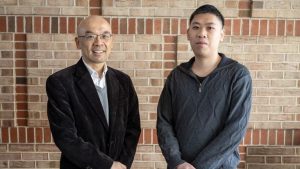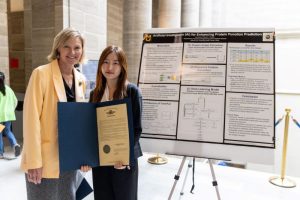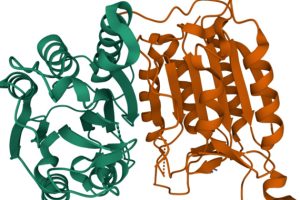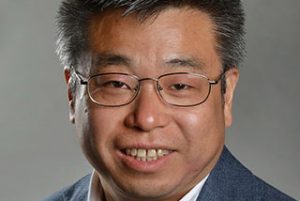
Jan. 23, 2025
Mizzou engineers earn distinction in advancing protein modeling and prediction
MULTICOM excels in five critical categories at the prestigious Critical Assessment of Structure Prediction.

April 11, 2024
Presenting engineering undergraduate research to legislators: A Q&A with Ahhyun Lee
Ahhyun Lee was one of 13 Mizzou students selected to present her research at Undergraduate Research Day at the Capitol last week. Read for a Q&A with Lee about her research, which focuses on using artificial intelligence to enhance protein function prediction.

Feb. 12, 2024
Elevating excellence for tomorrow’s innovators: Jianlin ‘Jack’ Cheng
Jianlin “Jack” Cheng is passing on his knowledge and preparing the next generation to solve some of society’s most pressing issues.

June 5, 2023
AI software can predict ‘roadmap’ for protein location, biological discoveries
Recently, Dong Xu, Curators' Distinguished Professor in the Department of Electrical Engineering and Computer Science at the University of Missouri, and colleagues updated their protein localization prediction model, MULocDeep, with the ability to provide more targeted predictions, including specific models for animals, humans and plants.

May 23, 2023
Cheng developing software to predict protein function using generative AI
A Mizzou Engineer has received funding from the National Science Foundation to develop a tool that will predict how a protein functions based on its order of amino acids. Jianlin “Jack” Cheng envisions developing open source software that would allow a user to enter the sequence, then the system would predict not only how that string of amino acids will form into a structure but also the role it will carry out within a cell. Additionally, the system would pinpoint the specific site of the protein that carries out the function.

March 6, 2023
Mizzou Engineer lends protein prediction expertise to climate change studies at Danforth Plant Science Center
An inter-institutional research team is using the power of computational analysis to pinpoint which plant genes confer resilience against rising temperatures that threaten global food supplies in the coming decades. Mizzou Engineering Professor Jianlin “Jack” Cheng — one of the first scientists in the world to use deep learning, a powerful artificial intelligence technique, to predict protein structures — adds a unique perspective to the work. Since 2018, he’s been collaborating with Dr. Ru Zhang, a plant scientist at the Danforth Plant Science Center in St. Louis, to leverage computational tools in the study of plant genes.

Jan. 11, 2023
Mizzou team ranks first in category at CASP15 protein prediction competition
A Mizzou Engineering team ranked within the top 10 in four different categories at an international protein prediction competition last month.

Feb. 22, 2022
Engineer uses advanced deep learning to predict where proteins will localize within cells
A Mizzou Engineer is developing computational tools that can be used to predict where proteins will localize within a cell. Using highly advanced deep learning, the resource could help researchers better understand how proteins function or, if positioned incorrectly within a cell, misfire and cause problems.

Feb. 4, 2022
Engineer proposes deep learning system to speed drug development
A Mizzou Engineer has proposed a new deep learning system that would speed up drug development by more accurately predicting how drugs and proteins interact.